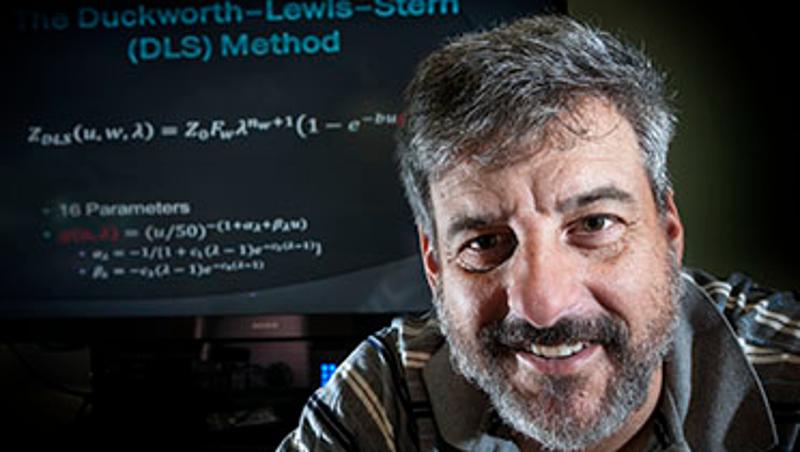
A QUT academic could play a crucial role in the cricket World Cup after unexpectedly writing his name into the game's official rulebook.
Cricket umpires have Professor Steve Stern, an Australian-American statistician who grew up playing baseball, on speed dial after he updated the Duckworth-Lewis (DL) method for determining the results of interrupted one-day matches.
The method, created by English statisticians Frank Duckworth and Tony Lewis in the early 1990s and first used in 1997, was in October officially changed to the Duckworth-Lewis-Stern (DLS) method to recognise Professor Stern's contribution.
Arguably the most complex rule in the game, DLS is based on a mathematical formula which ensures a result can always be reached in limited-overs matches interrupted by weather or another incident by working out revised run targets.
"For example, if the team batting first has their innings interrupted, the team batting second would typically be set a higher target to compensate for the fact that team one was initially batting with the idea that they would have more overs," Professor Stern said.
"Alternatively, if the team batting second was interrupted, it would only be fair to reduce their target because they would have fewer overs to bat than their opponents.
"The difference between Duckworth-Lewis-Stern and the original Duckworth-Lewis is DLS starts adjusting the formula if scores get really high. So it is an improvement for T20 matches and one-day matches with very high scores."
Professor Stern, from QUT's Science and Engineering Faculty, had little knowledge of cricket before being introduced to the game by Australian colleagues while studying for his PhD at Stanford University in California.
He fell in love with the game after emigrating to Australia in 1994.
"I've been a sports fanatic since I was a kid. But when I reached my teenage years I realised I wasn't ever going to be a professional athlete so I would have to get involved in other ways," Professor Stern said.
"Cricket and mathematics go hand in hand so it was an obvious choice."
With Duckworth and Lewis retired, Professor Stern is now the International Cricket Council's "official custodian" of the DLS method.
"It astonished me how forward-thinking the ICC were to bring this into the game in the early 1990s.There is not any other sport that I can think of that has a mathematical model built into the game as an actual rule," he said.
"I first contacted Frank Duckworth in 2004 with some ideas I had about the method. Fortunately he didn't dismiss me and we began to collaborate.
"I'm a bit of a hobbyist computer programmer and I created a program, modelled on an Excel spreadsheet, for the DLS. I showed it to the ICC and they decided to use it."
As well as handling queries from all over the world, often from disgruntled fans after their team has lost via DLS, Professor Stern is on hand to explain the intricacies of the system to any umpires who need it.
"Not many people know that at ICC one-day matches there is a dedicated DLS umpire. They are given a document which I wrote explaining the formula and my number is on there in case they need it. I have been called a few times."
With the unpredictable weather of an Australian summer and the regular chance of rain in New Zealand, Professor Stern said there was a good chance "at least one" World Cup match would use the DLS.
"In international cricket about 6 per cent of matches require DLS. But it's not always because of wild weather," he said.
"The most common causes are rain or power failure but there are more unusual examples. A swarm of flying ants once stopped a match for 45 minutes in South Africa and a match in Nepal was halted by a political protest."
Though he called for more education about the system that now bears his name, Professor Stern said he was hoping his services wouldn't be called upon.
"No one wants the game to be uninterrupted more than me. But if it's only a shower nobody wants the game to be called off," he said.
"The system isn't designed to be a substitute for a full game but, if part of the game is interrupted, it's preferable to have some kind of game.
"I am trying to educate more people in the game about the method and get it more into the standard parlance of cricket. I think it's incredible that even international players don't know the basic underpinnings of the rule - imagine saying the same thing about the lbw law!"
Media contact:
Rob Kidd, QUT Media, 07 3138 1841, rj.kidd@qut.edu.au
After hours, Rose Trapnell, 0407 585 901




